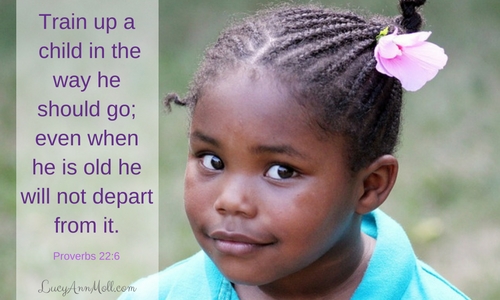by Lucy | Nov 7, 2017 | biblical counseling, emotions, relationships |
 You can become the best mom ever. God shows you the way by focusing on the heart.
You can become the best mom ever. God shows you the way by focusing on the heart.
Becoming the best mom ever doesn’t demand perfection. Not at all. If it did, we’d all fail! But it may require a shift in focus, specifically. . .
a focus on your child’s heart!
So many of us moms — me, included — tend to major on the externals: In other words, the child’s behavior, whatever his or her age. God, however, emphasizes the heart.
Above all else, guard your heart, for everything you do flows from it. Proverbs 4:23
Good Heart or Bad Yardstick?
Did you know that what your little angel or smart-aleck ruffian thinks, says, and does comes straight from their heart?
Click & Tweet!
We moms (and grandmas, dads, teachers, and so on) often measure our “success” based on the child’s behavior but what a faulty yardstick!
I imagine you may know a kid who had everything going for her from the outside, from excellent grades to great performance in sports or music (or both) to a 20-hour-a week, after-school job. I do. I’ll call her Leah.
Leah received mostly As in her honors classes. On her ACT test for college, she scored just a few points from perfect.
She also was a captain of the dance team.
And she played flute.
She had lots of friends from school and work. Her mom and dad praised her every accomplishment and demanded a photo-ready bedroom and designer outfits, and she regularly wrote thank-you notes with a reminder!
Then she went to college and things, well, you’ll have to read more of Leah story in my next post.
Becoming the Best Mom: P.R.A.Y.
Let me leave you with this encouragement: you can become the best mom ever by shepherding your child’s heart. To become the best mom ever who’s attentive to her child’s heart, you’ll need to:
1. Prepare!
2. Recognize you’re in a war.
3. Assume your role as a benevolent dictator.
4. Yield to God.
The next posts in the “Becoming the Best Mom Ever” series zero in to each of these heart-attentive topics.
P.S. It’s NEVER to late to start. 🙂
Counseling Hope to Your Heart,


by Lucy | Oct 27, 2016 | emotions, relationships

Blended families: Ups and downs, joys and messes. If you’re in a blended family, then you know what it takes to bring together two families. It’s hard work, isn’t it?
But if you’re considering remarriage after divorce or the death of a spouse: What should you do before you marry again?
Click & Tweet!
Two words: premarital counseling.
Already blended. . .and struggling? Counseling works for you too. Don’t despair. Be encouraged. At the end of this article you’ll find helps just for you.
Did you know your family is among the 40 percent of married couples with children in the US that are blended? This percentage counts full- and part-time residential step families with children under age 18 as well as adult children.
In this article, you’ll discover four main things regarding blended families:
- Take it slow!
- How premarital counseling works before remarriage.
- Helping the children.
- Encouragement for blended families.
Slow Down. . .When You Want to Speed Up
After years of parenting alone, it’s tempting to “follow your heart,” as today’s popular mantra advises, and marry quickly. As Ron Deal of Family Life Blended says, “You cook a stepfamily slowly in a Crockpot, not forcibly in a blender! Kids need more time than adults to get used to the idea of a wedding.”
For example, consider a couple I counseled who married within months of meeting each other. Fiona and Eli (names and details have been changed) were previously married and have five school-age children. (Two of the children also live their mom during the week.)
The couple disagreed over parenting, handling money, and dealing with the ex-spouses, among other things. Both of them are Christians and declared their love for each other. However, life’s struggles created significant stress. Fiona became controlling; Eli backed away. Sometimes he moved in with buddies for a few days for a break.
Meanwhile, the children were confused and acted out.
As one spouse said, “I just want to live and make life fun. It seems that everything is a task. I’m just drained.”
Click & Tweet!
Do these words resonate with you?
Did you go through pre-marital or pre-engagement counseling before you remarried? What difference has it made? If you didn’t have pre-marital counseling before remarriage, do you wish you had?
Pre-Marital Counseling Before Remarriage
First, during premarital counseling, you’ll think through the compexities of combining families and determine if the marriage is wise.
Second, you’ll discuss topics that may have factored in to a previous divorce — everything from communication and conflict resolution to parenting styles and personality differences. You won’t address every potential problem in premarital counseling but you will see the glaring ones.
Third, you’ll consider reasonable expectations between the children and the new spouse. Did you know that children cling to the hope that their parents will get back together? I did when my parents divorced when I was age eight. But when you remarry, your childrens’ dream dies. This is a loss for them.
Helping the Children
In premarital counseling, you’ll discover how to listen to the children–their hope, their fears.
You’ll also learn how to talk to the children about God’s role in blended families. Now they’ll have more people to love and support them! This includes the non-custodial parent when possible.
Sometimes chidlren become fearful that the new blended family will also end up in a divorce. In premarital counseling, you and your future spouse will develop a habit of praying with and for your children. reassuring them and each other that you choose to glorify God always.
5 Encouragements for Already Blended Families
Is your family already blended? You’ll appreciate these reminders from Ron Deal. I encourage you to peruse his ministry website, where you’ll find extra resources.
- SLOW your expectations of how quickly your blended family will harmonize. Deal says, “The average stepfamily needs between five to seven years to form a family identity. In movies, love between adults and bonding with children happens quickly; in real life, it happens gradually.”
- INVEST in your marriage relationship. It is the the new foundation for your home.
- BE a united parental team while building relationships with stepchildren. What about disciple? Deal urges, “Early on, biological parents should continue to be the primary disciplinarian to their children while stepparents build relationship, trust, and respect with stepchildren.”
- AVOID common pitfalls. For example, a child who says, “You’re not my mom, I don’t have to listen to you” is telling you about their sadness that mom isn’t here. Also, keep some holiday traditions while creating new ones. Money matters can be confusing too. Calmly discuss how you will balance your responsibilities to previous individual financial obligations (such as paying child support) while combining assets for the new family.
- STEP UP your faith. Spiritual resources help everyone in blended families find grace for each other and strength for the journey.
Sharing Hope with Your Heart,

by Lucy | Sep 20, 2016 | biblical counseling, emotions

When you hurt someone’s feelings, is it enough to say “I’m sorry”?
Or do these words fall flat when spoken without godly sorrow (2 Corinthians 7:10)? Is there a preferred alternative? Is so, what?
Years ago these questions swirled in my mind when one of my children called her sibling a name, snatched an item without permission, or smacked her on the head.
In this short article, I’ll share. . .
- an experiment that flopped
- the change that made the difference.
The main point: Don’t raise a little pharisee who knows the right words to say.
Click & Tweet!
Instead, train up a child to who desires to please the Lord.
The ‘I’m Sorry’ Method
Several Christian moms at my church, Bible study, and MOPS swore by a method to change their dear children’s behavior after a skirmish.
Picture this scenario: Carrie tiptoes into older sister Mary’s closet and snags a super cool top to wear. Later Mary sees Carrie at school in her top and pointed words fly like daggers. Later at home their mom learns of the problem and tells the swiper to return the top and say “I’m sorry” followed by “I forgive you” from the other sister, then they hug. She requires both girls to say “I’m sorry” and “I forgive you” for the mean words, and they hug again.
The mom in the scenario truly believes she’s getting to the root of the problem and that the girls learned a valuable lesson about taking without asking first and using hateful words. Have you found yourself in a similar situation? How did you discipline your kids?
My Experiment
Sort of hopeful (but not confident) this method would work, I tried a week-long experiment with my three children. I clued in my husband. A united front, right?
The plan: When one child was mean in some way to another, the offending kid had to say, “I’m sorry” whether or not she felt sorry. The offended kid had to say, “I forgive you” whether or not she truly forgave her — and they hugged.
The goal: to instill a humble, contrite spirit leading to true repentance. But did it work?
Ah, no.
Laura called Julia a name, said “I’m sorry” while rolling her eyes, and Julia said “I forgive you” with great enthusiasm, bless her heart. Their hug resembled a vice grip you might witness on WWE. Within minutes John hit Julia in the face with a bouncy ball. It was an accident.
“I’m sorry.”
“I forgive you.”
Vice-grip hug.
Those two began throwing things at each other just to get to the vice-grip hug. Laura was “like whatever” and escaped to her bedroom.
When a lamp crashed and a cat flew out of the way, I stopped the experiment. I could not handle another six days!
The experiment flopped.
My children said the right words without an inkling of repentance. I was raising vice-grip loving, little Pharisees!
Click & Tweet!
Change That Makes the Difference
The real point behind genuine sorrow is repentance. Wordly sorrow is fakery; it’s death.
Godly sorrow brings repentance that leads to salvation and leaves no regret, but worldly sorrow brings death (2 Corninthians 7:10).
“Sorrow,” in this context, refers to sorrow that is according to the will of God and produced by the Holy Spirit, says pastor John MacArthur whose Grace to You media ministry reaches millions. True repentance is impossible apart from genuine sorrow over one’s sin.
 This was my problem and my kids’ problem: The “I’m sorry” were just words, not genuine sorrow.
This was my problem and my kids’ problem: The “I’m sorry” were just words, not genuine sorrow.
Worldly sorrow has no redeeming value. This type of “I’m sorry” results from getting caught in a sin or from wounded pride, and leads to shame, despair, self-pity, and even death (see Mattew 27:3 for the account of Judas’ hanging).
Genuine repentance is at the very heart of one’s salvation. Believers repent of their sin continually as they turn from loveless thoughts, words, behaviors, and motivations and turn to God.
A person who is truly repentant experiences change in the inner person. Consider this:
But the things that come out of the mouth come from the heart, and these make a man ‘unclean.’ For out of the heart come evil thoughts, murder, adultery, sexual immorality, theft, false testimony, slander. (Matthew 15:18-19, NIV)
The Pharisees were experts in “good” behavior–as my children became adept at saying “I’m sorry” and vice-grip hugs–and missed heart change. True repentance cuts to the heart.
An Offer
Are your kids (young or older) driving you nuts? Do you need encouragment and godly counsel? Consider scheduling a free 15-minute phone call with me; contact me and we’ll set it up.
Sharing Hope with Your Heart,

by Lucy | Aug 25, 2016 | biblical counseling

A rebellious child is opposed to authority — yours! And his defiance hurts, doesn’t it? It causes you to question your effectiveness as a loving, godly mom. You may wonder if God has given you more than you can handle.
As a counselor I’ve heard from moms and dads who need help figuring out and responding to a rebellious child. My hope is to provide encouragement to you so you know. . .
This article is the last in a four-part series on teaching your children. The first one focused on younger kids, the second looked at teens, and the third considered young adult children. If you’re married, why not share these articles with your husband?
The goal: to encourage and equip you
with help and hope for your heart!
You Are Not Alone
Do any of these scenarios sound familiar?
“My daughter met this new kid who introduced her to weed. Now she sneaks out of the house and lies. What happened?”
“I can’t get through to my 24 year old. Over and over I tell him he has to get a job. He says he’ll look for one ‘tomorrow’ but never does.”
“Joey won’t do anything I ask him — pick up his stuff, turn off the TV, do his spelling homework. I don’t know what to do.”
Your child’s problem may be backtalk or bullying, stealing or sneaking out, lying or laziness — or all of these. Even “good” kids might rebel. They just coverup better, like my high-achieving high school friend who hid vodka in her locker.
Rebellion is worsening! In We Cannot Be Silent, R. Albert Mohler Jr. writes, “We are facing nothing less than a comprehensive redefinition of life, love, liberty, and the very meaning of right and wrong.” Do you agree?
God’s Word Has Everything You Need
As you wrestle through the issues of parenting a rebellious child, have you found hope and comfort in the all-sufficient written Word?
Romans 8:28 has an encouraging message. Please do not let its familiarity blow by you.
We know that for those who love God all things work together for good for those who are called according to his purpose.
All things. Including the hard. Especially the hard.
The Lord promises:
I will never leave you or forsake you. So we can confidently say, ‘The Lord is my helper; I will not fear; what can man do to me? Hebrews 13:5-6
May I encourage you to read the Bible daily? Like nothing else, God’s Word strengthens you and comforts you. It instructs and convicts. It is God speaking to YOU.
Click & Tweet!
Jot down important truths God impresses on you. Think on these truths (Philippians 4:8).
You Have an Identifiable Enemy
When your son blames you, when your daughter refuses to follow rules — know this: Yes, your rebellious child is reponsible for their own sin. However, Satan loves to rip apart a family any way he can. He tempts your children to hate you!
Mom, you are in a spiritual war. This war has an eternal significance. Satan is your enemy.
What you can do:
In addition to prayer and reading your Bible for strength, comfort, and insight:
- Discipline your rebellious child. Biblical discipline, say Elyse Fitzpatrick and Jim Newheiser in When Good Kids Make Bad Choices, is the process of setting clear standards for behavior based on the Bible, requiring immediate and respectful obedience, and then taking measured discipinary action when the rules are not obeyed. In a future post, I’ll spell out what this looks like in real life. Meanwhile, if you need help now, please contact me. I counsel by Skype and in person.
- Love your rebellious child. When your child–whether age 4 or age 24–acts like your enemy, choose to show them love (Matthew 5:44-45). Resist revenge. Do good. Forgive as you have been forgiven (Ephesians 4:32). Speak life-giving words.
Remind yourself that your rebellious child is NOT the real enemy.
God Gives You His Power to Persevere
Parenting a rebellious child affects you! You may experience anger, fear, and depression. Here are a few practical ideas for you to glorify God. Remember, you have God’s power to lead a godly life.
His divine power has given us everything we need for a godly life through our knowledge of him who called us by his own glory and goodness. 2 Peter 1:3
- Pray for your child with your husand if you’re married (and he’s a believer). Prayer demonstrates your reliance on God.
- Thank God for the trial. (Romans 5:3-5, James 1:2-4) Thanking God will lessen your anxiety and complaints.
- Ask God how you can change? Perhaps you are too permissive or authoritarian. Maybe spending more time with your child will improve communication.
- Ask your child for forgiveness. (Matthew 7:1-5) When you sin against your child, tell her you sinned, confess your wrongdoing, and repent. Your demonstration of true humility will have an effect for the good.
These godly responses toward a rebellious child may sound impossible.
Apart from Me you can do nothing. John 15:5
However,
If you abide in Me and My words abide in you, ask whatever you wish, and it shall be done for you. John 15:7
Truly, on your own it is impossible be an effective, loving godly mom to a rebellious child, but in Christ you can persevere. You can have true joy in the journey.
Sharing Hope with Your Heart,

by Lucy | Aug 16, 2016 | biblical counseling

Teaching your child to love the Lord with all his heart and with all his soul and with all his mind. . .
Isn’t this the deepest hope of every Christian mom and grandma?
Of course it is. You want to parent in truly biblical ways. You probably consider Christian mothering more important than helping your child do math problems or learn spelling words. You’re right!
But don’t you feel ill-equipped for teaching a child to love the Lord? Are you afraid you’ll mess up? Or that you already have?
Teaching a child to love the Lord is daunting, worthy of an oh-my-God-help-me prayer.
Click & Tweet!
But it also is rewarding and among the greatest blessings of parenthood. It is God’s call to every mom and dad!
Train up a child in the way he should go; even when he is old he will not depart from it. Proverbs 22:6
4 Parts in a Parenting Series
This article is the first in a four-part series on teaching your child to love God. The first focuses on younger children. The second zeroes in on preteens and teens. The third on young adults. The fourth is encouragment for moms and grandmas! You need it, don’t you? A drink of water to cool your thirst.
(Do you want the whole series? Please subscribe to this blog.)
Each article is short and has recommended resources for you to learn more about godly parenting.
What you won’t find is drivel from popular parenting blogs or fluffy books that sell themselves as “Christian” yet fail to contain Scripture or use it rightly. Instead, you’ll get words of God’s wisdom from God.
What’s Your Goal?
Have you stopped and asked yourself, “What am I trying to accomplish as a Christian mom?”
Why not cling to the apostle Paul’s goal for his spiritual children? That they be changed into the image of Christ.
. . .my little children, for whom I am again in the anguish of childbirth until Christ is formed in you! Galatians 4:19, ESV
The phrase “formed in you” refers to becoming more and more like Christ. It’s synonymous with complete in Christ (Colossians 2:9-11). The church word is sanctification.
How do you teach your child to become more and more like Christ?
I love the way biblical counselor Lou Priolo specifies the three ingredients of the “Christ formed in you” process:
the Spirit, the Scriptures, and time.
INGREDIENT 1: The Spirit
Your child needs the Holy Spirit for heart transformation so he or she can become more and more like Christ. No Spirit, no godliness or growth or anything good.
Mom, you do not want a “well-behaved” child.
Click & Tweet!
Your goal as a parent is teaching your child to love the Lord with all their heart.
Keep your heart with all vigilance,
for from it flow the springs of life. Proverbs 4:23
Your part: As early as possible, begin teaching your child about who Jesus is according to the Bible.
INGREDIENT 2: The Scriptures
Can a Young Child Learn Spiritual Truths?
Yes! Here are two examples.
- Timothy, a young man, whom the apostle Paul befriended learned God’s Word from a young age.
. . .and how from childhood you have been acquainted with the sacred writings, which are able to make you wise for salvation through faith in Christ Jesus. 2 Timothy 3:15
Guess who was integral to Timothy learning scripture? His mom and grandma!
I am reminded of your sincere faith, a faith that dwelt first in your grandmother Lois and your mother Eunice and now, I am sure, dwells in you as well. 2 Timothy 1:5
2. Lou Priolo shares the sweet story of his daughter Sophia, who was 2 years old at the time, saying “Daddy, you should ‘Do all things without complaining or arguing'” — quoting Philippians 2:14. The little girl quoted Scripture after her Daddy sighed grudgingly when asked by his wife to do something.
Hearing a little child quote Scripture is music, isn’t it?
Click & Tweet!
Does your child know some Bible verses? Do they flow from your child’s heart easily and often?
Your part: Teach your child to love the Lord by quoting Scripture. Show him or her the verse in the Bible. Read it together. Memorize it.
INGREDIENT 3: Time
It takes time to teach your child to love the Lord. God didn’t invent an “instant mature Christian” pill. As mentioned, becoming more and more like Christ is a process. While teaching your child, you’ll grow spiritually too.
It’s worth the investment of your energy, isn’t it?
Don’t worry if you don’t get it all right. Who has lived a perfect life but Christ?
Your part: Breathe. Pray. Believe God loves your child better than you do. Smile.
Great Resources for Teaching Your Child
I highly recommend these resources for teaching your child. I’ll have more in my next blog post that focuses on preteens and teens.
Give Them Grace: Dazzing Your Kids with the Love of Jesus by Elyse Fitzpatrick & Jessica Thompson.
Instructing a Child’s Heart by Tedd & Marcy Tripp
Shepherding a Child’s Heart by Ted Tripp
Teach Them Diligently: How to Use the Scriptures in Child Training by Lou Priolo
Sharing Hope with Your Heart,

 You can become the best mom ever. God shows you the way by focusing on the heart.
You can become the best mom ever. God shows you the way by focusing on the heart. 



 This was my problem and my kids’ problem: The “I’m sorry” were just words, not genuine sorrow.
This was my problem and my kids’ problem: The “I’m sorry” were just words, not genuine sorrow.


